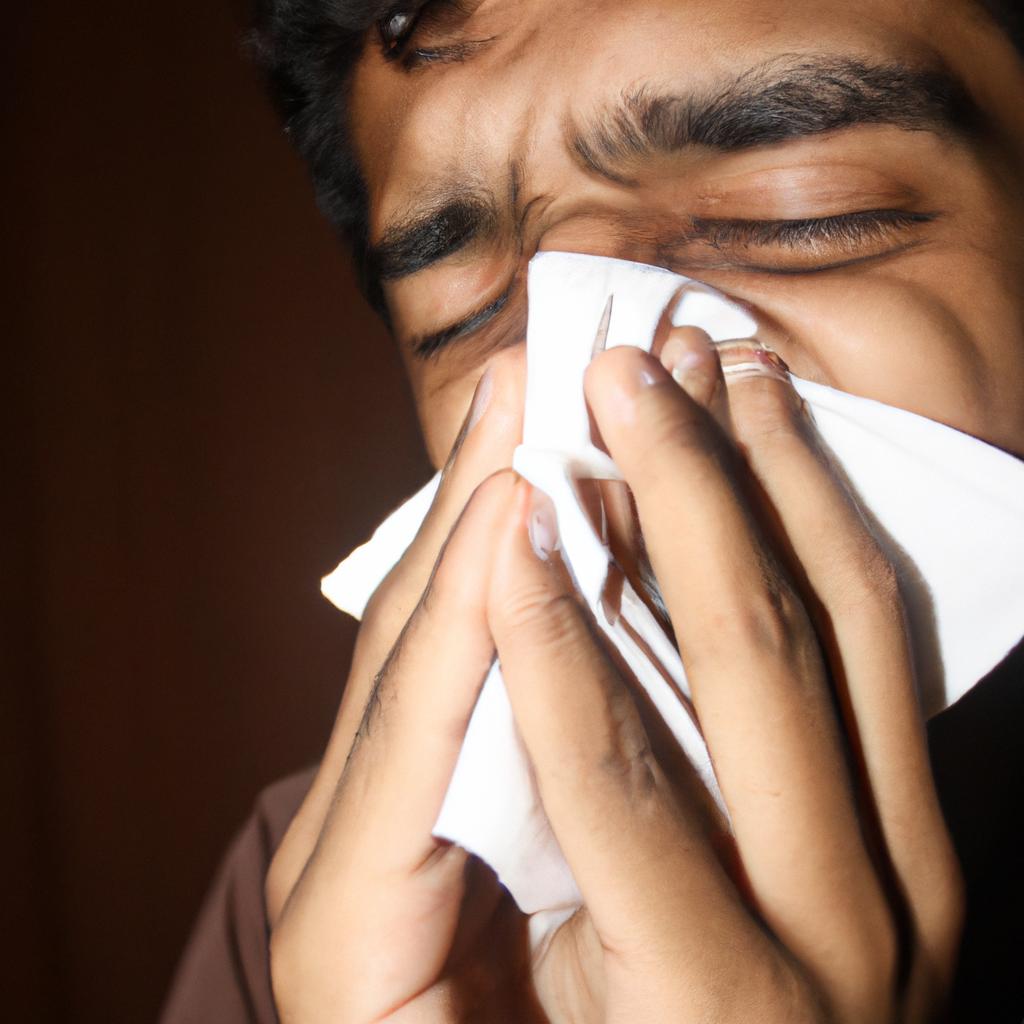Allergies are a common health condition that affects millions of individuals worldwide. From food allergies to environmental triggers, allergies can significantly impact an individual’s quality of life and overall well-being. For instance, consider the case of Sarah, a 30-year-old woman who experiences severe allergic reactions to peanuts. Even a small trace of peanuts in her surroundings or diet can lead to anaphylaxis, a potentially life-threatening condition. This example highlights the seriousness of allergies and underscores the importance of prevention and management strategies.
Managing health conditions and diseases requires diligent effort and knowledge about preventative measures to minimize potential risks. When it comes to preventing allergies, understanding the causes and triggers is crucial for effective management. Allergic reactions occur when the immune system overreacts to substances such as pollen, pet dander, or certain foods like shellfish or nuts. By identifying these triggers through medical testing or personal observation, individuals can take proactive steps towards avoiding exposure and reducing the likelihood of an allergic reaction.
Moreover, implementing lifestyle changes and adopting preventive measures play vital roles in managing allergies. Individuals with known allergens should be cautious while dining out by reading ingredient labels carefully or asking restaurant staff about potential cross-contamination risks. It is also recommended for them to carry epineph ine auto-injectors (such as an EpiPen) at all times, especially if they have a history of severe allergic reactions. This medication can be life-saving in the event of an anaphylactic reaction and should be administered immediately while waiting for emergency medical assistance.
In addition to being prepared for emergencies, individuals with allergies can take steps to minimize exposure to allergens in their everyday lives. For example, using air purifiers or filters at home can help reduce airborne allergens like pollen or pet dander. Cleaning regularly and keeping living spaces free from dust mites can also make a significant difference in managing allergies.
Furthermore, allergy medications such as antihistamines can provide relief by blocking the release of histamine, which is responsible for many allergy symptoms. These medications are available over-the-counter or by prescription and can help alleviate symptoms such as sneezing, itching, and congestion. It’s essential to consult with a healthcare professional to determine the most suitable medication and dosage based on individual needs.
Finally, it is crucial for individuals with allergies to stay informed about current research and developments in the field. Allergies are a complex area of medicine, and new treatments or management strategies may become available over time. By staying updated and working closely with healthcare professionals, individuals can optimize their allergy management plan.
Remember that allergies are unique to each individual, so it’s essential to tailor prevention and management strategies accordingly. Consulting with a healthcare professional who specializes in allergies will provide personalized guidance based on specific triggers and symptoms. With proper understanding, preparation, and proactive measures, individuals can effectively manage their allergies and lead healthier lives.
Understanding the triggers
Allergies, an immune response to substances known as allergens, affect millions of people worldwide. The understanding and identification of triggers play a crucial role in managing allergies effectively. By recognizing these triggers, individuals can take proactive measures to minimize exposure and prevent allergic reactions.
For instance, consider a hypothetical case study involving Sarah, who experiences persistent sneezing and itchy eyes whenever she spends time outdoors during pollen season. In this scenario, pollen serves as the trigger for Sarah’s allergic symptoms. Identifying such triggers is essential because it allows individuals like Sarah to modify their behavior or environment accordingly.
To better understand the common triggers associated with allergies, let us explore some examples:
- Dust mites: These microscopic creatures thrive in warm and humid environments such as bedding, carpets, and upholstered furniture.
- Pet dander: Allergy sufferers may experience symptoms when exposed to proteins found in animal skin flakes, saliva, or urine.
- Mold spores: Mold grows in damp areas such as bathrooms and basements and releases tiny spores that can cause allergic reactions.
- Pollen: Plants release pollens into the air during specific seasons, triggering allergies in susceptible individuals.
| Allergen | Health Conditions/Diseases |
|---|---|
| Dust mites | Asthma exacerbation |
| Pet dander | Allergic rhinitis |
| Mold spores | Respiratory infections |
| Pollen | Hay fever (allergic rhinitis) |
Understanding these allergy triggers not only helps individuals avoid potential allergens but also aids healthcare professionals in developing personalized management strategies. By identifying specific triggers that contribute to allergic reactions in patients, medical experts can provide targeted advice on prevention methods tailored to each individual’s needs.
Transitioning into the subsequent section on “Avoiding allergens,” individuals can implement strategies to minimize exposure and effectively manage their allergies. By taking proactive steps, such as creating an allergen-free environment and practicing good personal hygiene, individuals can significantly reduce the risk of allergic reactions without relying heavily on medication or medical interventions.
Avoiding allergens
Understanding the Triggers and Avoiding Allergens: Essential Steps for Preventing Allergies
Imagine a scenario where Lisa, a 10-year-old girl with severe allergies to peanuts, is attending her friend’s birthday party. As she excitedly joins in on the fun, she accidentally consumes a treat containing peanuts. Within minutes, she experiences an allergic reaction, struggling to breathe and breaking out in hives. This unfortunate incident highlights the importance of understanding triggers and avoiding allergens when managing health conditions like allergies.
To effectively prevent allergies, it is crucial to identify common triggers that can provoke allergic reactions. These triggers vary from person to person but commonly include substances such as pollen, pet dander, dust mites, mold spores, certain foods (e.g., nuts or shellfish), medications (like penicillin), insect stings, and latex. By recognizing these potential threats, individuals can take appropriate measures to minimize their exposure.
Avoiding allergens plays a pivotal role in preventing allergy symptoms and reducing the risk of severe reactions. Here are some practical strategies:
- Keep indoor environments clean by regularly vacuuming carpets and upholstery.
- Use hypoallergenic bedding materials to reduce exposure to dust mites.
- Minimize contact with pets if they trigger your allergies; consider keeping them out of sleeping areas.
- Install high-efficiency particulate air (HEPA) filters in HVAC systems or use standalone air purifiers.
By implementing these simple steps into daily routines, individuals can significantly reduce their exposure to allergens and subsequently decrease the likelihood of experiencing allergic reactions.
| Trigger | Common Sources | Potential Symptoms |
|---|---|---|
| Pollen | Trees, grasses | Sneezing |
| Pet dander | Cats, dogs | Itchy eyes |
| Dust mites | Bedding | Asthma attacks |
| Mold spores | Damp areas | Wheezing |
Understanding the triggers and actively avoiding allergens are essential components of allergy management. By being mindful of potential hazards and taking necessary precautions, individuals can create a safer environment for themselves or their loved ones.
[Transition Sentence] As we delve into the importance of maintaining a clean environment, it becomes evident that cleanliness plays an integral role in managing health conditions effectively.Maintaining a clean environment
Building upon the importance of avoiding allergens, another vital aspect of preventing allergies is maintaining a clean environment. By keeping our surroundings free from potential triggers, we can significantly reduce the risk of allergic reactions and manage health conditions more effectively.
To illustrate the significance of this approach, let’s consider an example. Imagine Sarah, who has been diagnosed with asthma triggered by dust mites. Despite taking medication regularly, she continues to experience frequent flare-ups at home. Upon investigation, it becomes evident that her living space lacks proper cleaning measures and harbors excessive amounts of dust. This scenario exemplifies how unaddressed environmental factors can impede allergy management and overall well-being.
In order to create a safe and conducive environment for individuals prone to allergies, here are some key strategies to implement:
- Regularly deep clean your living spaces, including vacuuming carpets, washing bedding in hot water weekly, and wiping down surfaces with damp cloths.
- Minimize clutter as it can accumulate dust and other allergens over time.
- Use hypoallergenic pillows and mattress covers to protect against dust mites.
- Install high-efficiency particulate air (HEPA) filters in HVAC systems or air purifiers to remove airborne particles.
Table: Allergy-Friendly Cleaning Products
| Product | Benefits | Features |
|---|---|---|
| Hypoallergenic | Suitable for sensitive skin | Free from common irritants |
| Non-toxic | Safe for children & pets | No harmful chemicals or fumes |
| Fragrance-free | Reduces respiratory irritation | Avoids triggering allergic reactions |
Creating an allergen-free environment not only helps manage existing allergies but also plays a crucial role in preventing new ones from developing. A cleaner setting reduces exposure to potential triggers such as pollen, pet dander, mold spores, and dust mites. By implementing the strategies outlined above, individuals can proactively safeguard their health and well-being.
With a clean environment established, it is important to acknowledge the impact of stress on allergies and overall health. Managing stress levels effectively can contribute significantly to preventing allergic reactions and maintaining optimal well-being.
Managing stress levels
Transitioning from the previous section on maintaining a clean environment, it is important to also consider managing stress levels as another crucial aspect of preventing allergies. Let us explore some effective strategies for managing stress and its impact on allergy prevention.
Imagine a scenario where an individual with seasonal allergies experiences heightened symptoms during periods of high stress. This hypothetical case highlights the potential connection between stress and allergic reactions, emphasizing the need to address stress management as part of an overall approach to preventing allergies.
To effectively manage stress and reduce its impact on allergies, consider implementing the following strategies:
- Engage in regular physical activity: Regular exercise has been shown to lower stress levels and improve overall well-being. Incorporate activities such as walking, jogging, or yoga into your routine.
- Practice relaxation techniques: Techniques like deep breathing exercises, meditation, or mindfulness can help alleviate stress and promote a sense of calmness.
- Maintain a healthy diet: A nutritious diet rich in fruits, vegetables, whole grains, and lean proteins can support your body’s ability to handle stress.
- Seek social support: Connecting with loved ones or joining supportive communities can provide emotional comfort and aid in reducing stress levels.
In addition to these strategies, it may be helpful to visually represent the relationship between stress management and allergy prevention using a table:
| Stress Management | Allergy Prevention |
|---|---|
| Regular exercise | Reduced symptoms |
| Relaxation | Lowered sensitivity |
| Healthy diet | Stronger immune system |
| Social support | Enhanced well-being |
By addressing these factors through various methods of stress management, individuals can potentially experience reduced allergic reactions and improved overall health.
As we have discussed strategies for maintaining a clean environment and managing stress levels as vital components of preventing allergies, seeking professional advice becomes essential in developing personalized plans that cater specifically to one’s unique needs. The subsequent section will delve further into this topic while exploring avenues for seeking professional advice on managing health conditions and diseases.
Seeking professional advice
Section H2: Seeking professional advice
Transitioning from the previous section on managing stress levels, it is crucial to seek professional advice when dealing with health conditions and diseases. Let us consider an example to understand the importance of seeking expert guidance. Sarah, a 35-year-old woman diagnosed with severe allergies, was struggling to manage her symptoms effectively. She decided to consult an allergist who provided personalized recommendations based on her specific condition.
When it comes to preventing allergies and managing other health conditions, seeking professional advice can offer numerous benefits. Here are some key reasons why consulting experts in the field is essential:
- Accurate diagnosis: Professionals have extensive knowledge and experience in diagnosing various health conditions accurately. Their expertise allows them to identify the root cause behind allergies or any other disease, which is vital for effective management.
- Tailored treatment plans: Each individual’s health condition is unique, and professionals understand this well. They develop personalized treatment plans that address specific needs, ensuring optimal results.
- Access to specialized resources: Professionals often have access to advanced diagnostic tools and treatments that may not be readily available elsewhere. This enables patients to benefit from cutting-edge techniques and therapies.
- Continuous monitoring and support: Seeking professional advice ensures continuous monitoring of your condition over time. Regular check-ups help evaluate progress, make necessary adjustments to treatment plans if needed, and provide ongoing support throughout your journey towards better health.
| Benefits of Seeking Professional Advice |
|---|
| Accurate diagnosis |
| Tailored treatment plans |
| Access to specialized resources |
| Continuous monitoring and support |
In conclusion, seeking professional advice plays a pivotal role in effectively managing health conditions and diseases such as allergies. By receiving accurate diagnoses, tailored treatment plans, accessing specialized resources, and benefiting from continuous monitoring and support, individuals can significantly improve their overall well-being. With these foundations in place, one can now proceed towards developing a healthy lifestyle.
With professional guidance at hand, the next step towards preventing allergies and managing health conditions is developing a healthy lifestyle.
Developing a healthy lifestyle
Transitioning from seeking professional advice, it is essential to develop a healthy lifestyle in order to prevent allergies and manage existing health conditions effectively. Let’s consider the case of Sarah, a 35-year-old woman who has been diagnosed with asthma and seasonal allergies. By making certain adjustments to her daily routine and adopting healthier habits, Sarah was able to significantly reduce the frequency and severity of her symptoms.
Firstly, maintaining good hygiene practices can help minimize exposure to allergens. Sarah learned that regularly washing her hands with soap and water, especially after coming into contact with potential triggers like pet dander or pollen, can greatly reduce the likelihood of an allergic reaction. Additionally, she discovered the importance of keeping her living environment clean by dusting surfaces frequently and using hypoallergenic bedding covers.
Secondly, incorporating regular exercise into one’s routine has proven beneficial for managing allergies. Sarah started engaging in moderate-intensity activities such as walking or cycling for at least 30 minutes a day. This not only improved her overall fitness but also helped strengthen her respiratory system, allowing better control over asthma symptoms. Exercise releases endorphins which can provide a natural mood boost while reducing stress levels—an important factor that often exacerbates allergy symptoms.
Lastly, proper nutrition plays a crucial role in preventing allergies and boosting overall immune function. Sarah made dietary changes by increasing her intake of fruits rich in antioxidants such as berries and citrus fruits. She also included omega-3 fatty acids found in fish like salmon or flaxseeds in her meals. These nutrient-dense foods provided anti-inflammatory benefits, helping alleviate some of the discomfort caused by allergies.
To further emphasize these points:
-
Practicing good hygiene:
- Wash hands regularly.
- Use hypoallergenic products.
-
Regular exercise:
- Engage in moderate-intensity activities.
- Strengthen respiratory system.
-
Healthy nutrition:
- Increase consumption of antioxidant-rich fruits.
- Incorporate omega-3 fatty acids through fish or flaxseeds.
| Practice good hygiene | Regular exercise | Healthy nutrition |
|---|---|---|
| Wash hands regularly | Engage in moderate activities | Increase fruit consumption |
| Use hypoallergenic products | Strengthen respiratory system | Incorporate omega-3 fatty acids |
By adopting these lifestyle changes, individuals like Sarah can effectively manage and prevent allergies. It is important to remember that everyone’s experience with allergies may differ, so it is crucial to consult a healthcare professional for personalized advice. Making small adjustments in daily habits and prioritizing self-care can go a long way in improving overall health and managing allergy-related conditions.
 Web Firma
Web Firma



